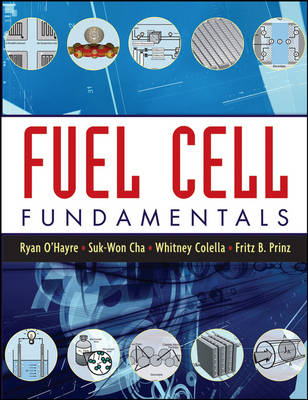
Fuel Cell Fundamentals
John Wiley & Sons Inc (Verlag)
978-0-471-74148-0 (ISBN)
- Titel gebraucht verfügbar
- Artikel merken
"Fuel Cell Fundamentals" is an introductory-level textbook covering the basic science and engineering behind fuel cell technology. Focusing on the fundamentals, it provides straightforward descriptions of how fuel cells work, why they offer the potential for high efficiency, and how their unique advantages can best be used. Emphasis is placed on the founding scientific principles that govern fuel cell operations. Designed to be accessible to fuel cell beginners, it is suitable for any engineering or science major with a background in calculus, basic physics, and elementary thermodynamics. The book is divided in two parts: The first (and largest part), "Fuel Cell Principles" focuses on basic fuel cell physics. The second part: "Fuel Cell Technology" provides a brief discussion of the practical applications of fuel cell technology. "Fuel Cell Fundamentals" provides examples, problems, and pedagogy for classroom use. A solutions manual is available.
RYAN O'HAYRE, PhD, is serving an NSF fellowship at the Technical University of Delft in the Netherlands. SUK-WON CHA, PhD, is an assistant professor in the School of Mechanical and Aerospace Engineering at Seoul National University. WHITNEY COLELLA, PhD, is a postdoctoral researcher in the Department of Civil and Environmental Engineering at Stanford University. FRITZ B. PRINZ, PhD, is the Rodney H. Adams Professor in the School of Engineering and serves as Chair in the Department of Mechanical Engineering at Stanford University.
PREFACE.ACKNOWLEDGEMENTS.NOMENCLATURE.I FUEL CELL PRINCIPLES.1 INTRODUCTION.1.1 What Is a Fuel Cell?1.2 A Simple Fuel Cell.1.3 Fuel Cell Advantages.1.4 Fuel Cell Disadvantages.1.5 Fuel Cell Types.1.6 Basic Fuel Cell Operation.1.7 Fuel Cell Performance.1.8 Characterization and Modeling.1.9 Fuel Cell Technology.1.10 Fuel Cells and the Environment.2 FUEL CELL THERMODYNAMICS.2.1 Thermodynamics Review.2.2 Heat Potential of a Fuel: Enthalpy of Reaction.2.3 Work Potential of a Fuel: Gibbs Free Energy.2.4 Predicting Reversible Voltage of a Fuel Cell under Non-Standard-State Conditions.2.5 Fuel Cell Efficiency.3 FUEL CELL REACTION KINETICS.3.1 Introduction to Electrode Kinetics.3.2 Why Charge Transfer Reactions Have an Activation Energy.3.3 Activation Energy Determines Reaction Rate.3.4 Calculating Net Rate of a Reaction.3.5 Rate of Reaction at Equilibrium: Exchange Current Density.3.6 Potential of a Reaction at Equilibrium: Galvani Potential.3.7 Potential and Rate: Butler-Volmer Equation.3.8 Exchange Currents and Electrocatalysis: How to Improve Kinetic Performance.3.9 Simplified Activation Kinetics: Tafel Equation.3.10 Different Fuel Cell Reactions Produce Different Kinetics.3.11 Catalyst-Electrode Design.3.12 Quantum Mechanics: Framework for Understanding Catalysis in Fuel Cells.4 FUEL CELL CHARGE TRANSPORT.4.1 Charges Move in Response to Forces.4.2 Charge Transport Results in a Voltage Loss.4.3 Characteristics of Fuel Cell Charge Transport Resistance.4.4 Physical Meaning of Conductivity.4.5 Review of Fuel Cell Electrolyte Classes.4.6 More on Diffusivity and Conductivity (Optional).4.7 Why Electrical Driving Forces Dominate Charge Transport (Optional).5 FUEL CELL MASS TRANSPORT.5.1 Transport in Electrode versus Flow Structure.5.2 Transport in Electrode: Diffusive Transport.5.3 Transport in Flow Structures: Convective Transport.6 FUEL CELL MODELING.6.1 Putting It All Together: A Basic Fuel Cell Model.6.2 A 1D Fuel Cell Model.6.3 Fuel Cell Models Based on Computational Fluid Dynamics (Optional).7 FUEL CELL CHARACTERIZATION.7.1 What Do We Want to Characterize?7.2 Overview of Characterization Techniques.7.3 In Situ Electrochemical Characterization Techniques.7.4 Ex Situ Characterization Techniques.II FUEL CELL TECHNOLOGY.8 OVERVIEW OF FUEL CELL TYPES.8.1 Introduction.8.2 Phosphoric Acid Fuel Cell.8.3 Polymer Electrolyte Membrane Fuel Cell.8.4 Alkaline Fuel Cell.8.5 Molten Carbonate Fuel Cell.8.6 Solid-Oxide Fuel Cell.8.7 Summary Comparison.9 OVERVIEW OF FUEL CELL SYSTEMS.9.1 Fuel Cell Stack (Fuel Cell Subsystem).9.2 The Thermal Management Subsystem.9.3 Fuel Delivery/Processing Subsystem.9.4 Power Electronics Subsystem.9.5 Case Study of Fuel Cell System Design: Sizing a Portable Fuel Cell.10 FUEL CELL SYSTEM INTEGRATION AND SUBSYSTEM DESIGN.10.1 Integrated Overview of Four Primary Subsystems.10.2 External Reforming: Fuel Processing Subsystems.10.3 Thermal Management Subsystem.11 ENVIRONMENTAL IMPACT OF FUEL CELLS.11.1 Life Cycle Assessment.11.2 Important Emissions for LCA.11.3 Emissions Related to Global Warming.11.4 Emissions Related to Air Pollution.11.5 Analyzing Entire Scenarios with LCA.APPENDIXES.A. CONSTANTS AND CONVERSIONS.B. THERMODYNAMIC DATA.C. STANDARD ELECTRODE POTENTIALS AT 25 C.D. QUANTUM MECHANICS.D.1. Atomic Orbitals.D.2. Postulates of Quantum Mechanics.D.3. One-Dimensional Electron Gas.D.4. Analogy to Column Buckling.D.5 .Hydrogen Atom.E. GOVERNING EQUATIONS OF CFD FUEL CELL MODEL.F. PERIODIC TABLE OF THE ELEMENTS.G. SUGGESTED FURTHER READING.BIBLIOGRAPHY.IMPORTANT EQUATIONS.INDEX.
| Erscheint lt. Verlag | 10.1.2006 |
|---|---|
| Zusatzinfo | Illustrations |
| Verlagsort | New York |
| Sprache | englisch |
| Maße | 199 x 244 mm |
| Gewicht | 873 g |
| Einbandart | gebunden |
| Themenwelt | Technik ► Elektrotechnik / Energietechnik |
| ISBN-10 | 0-471-74148-5 / 0471741485 |
| ISBN-13 | 978-0-471-74148-0 / 9780471741480 |
| Zustand | Neuware |
| Haben Sie eine Frage zum Produkt? |
aus dem Bereich




